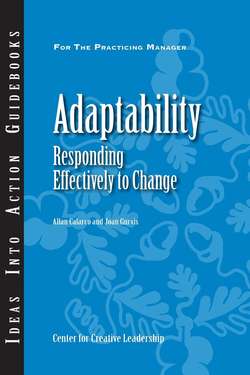Читать книгу Adaptability: Responding Effectively to Change - Allan Calarco - Страница 9
На сайте Литреса книга снята с продажи.
ОглавлениеWhy Adaptability Is Important for Leaders
Leaders all over the world are facing changes like the one described previously—new cultures, new jobs, new markets, new everything. Dramatic change creates a feeling of uncertainty, self-consciousness, even fear. From experience, you probably know that even minor change can have a powerful effect. Nor do you have to be working globally to be affected by the pace and complexity of change. In any town and in any job, leaders are facing business and leadership challenges unlike those of previous generations.
Given the current complexities of work, the sheer volume of information flowing in, and the rapid changes taking place, it makes sense that leaders (and the people they lead) must be adaptive—after all, people are doing their best to adjust and deal with change every day. Adaptability is no longer a nicety or a coping mechanism. Adaptability is a leadership imperative. Without the ability to adapt to change, a manager previously seen as successful and full of potential is likely to be fired, demoted, or held on a career plateau.
Many of the challenges facing organizations today are considered adaptive challenges, systemic challenges with no clear solutions. They involve creating new processes, systems, or skills, whereas a technical challenge requires a redistribution of resources and a well-defined plan of action. The greater complexity of today’s organizational challenges requires leaders to work in new ways. They need to be skilled adapters.
Why Adapt?
Frequency: Leaders must constantly deal with change.
Personalization: Leaders must understand change personally before helping others through it.
Role modeling: People look to and rely on their leaders in times of change.
Success: Adaptability is important for leader effectiveness and success—especially during times of change.
When leaders are inflexible, rigid, or narrowly focused, they limit their ability to respond effectively to the changing environment. Just as important, they discourage or limit the adaptability of colleagues and subordinates. New initiatives may be halted or stifled. Resistance to change may undermine critical projects or systemwide implementation. Employee enthusiasm, cooperation, morale, and creativity are jeopardized, making it all the more difficult to run the business or organization.
When leaders understand their own reactions to change and develop adaptable behaviors, they face change more effectively. Adaptable leaders accept change. They find ways to manage complex and unknown challenges, and they learn new skills and behaviors that help them thrive in times of transition. People working with adaptable leaders have role models and guides to help them work through change in a productive, genuine way.
Developing and demonstrating adaptability yourself will have a positive impact on those you lead. Just as when you travel in an airplane you are instructed to put on your own emergency oxygen mask before helping others, teaching yourself to be more adaptable will benefit others. Increased flexibility will allow you to be more effective in your efforts to set a course, make decisions, and manage change. Your behavior will help set the tone in your work group and organization. You may also begin to take on a coaching or mentoring role, or set team goals to improve the ability to adapt.
